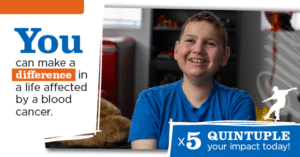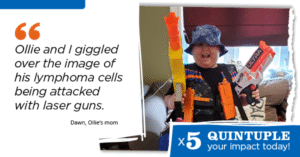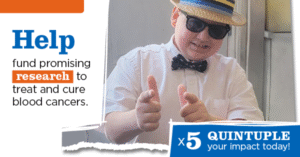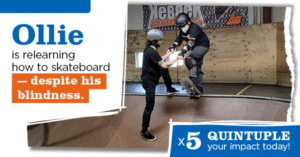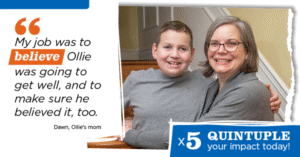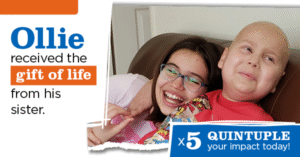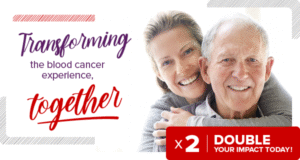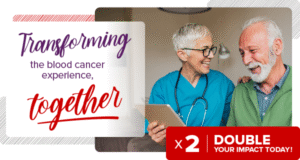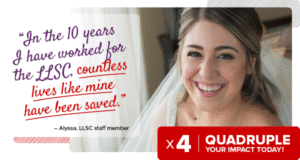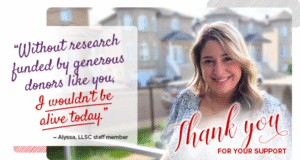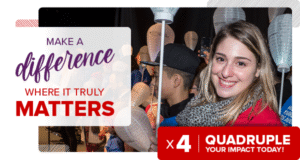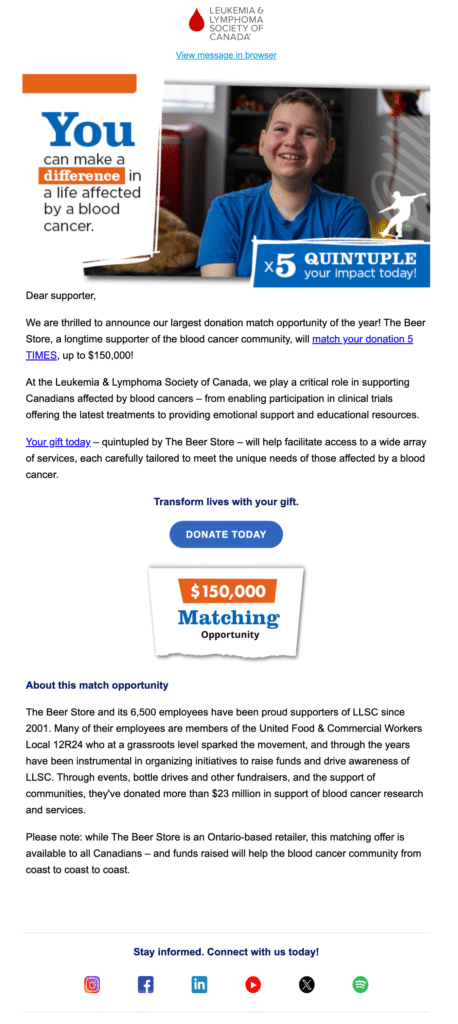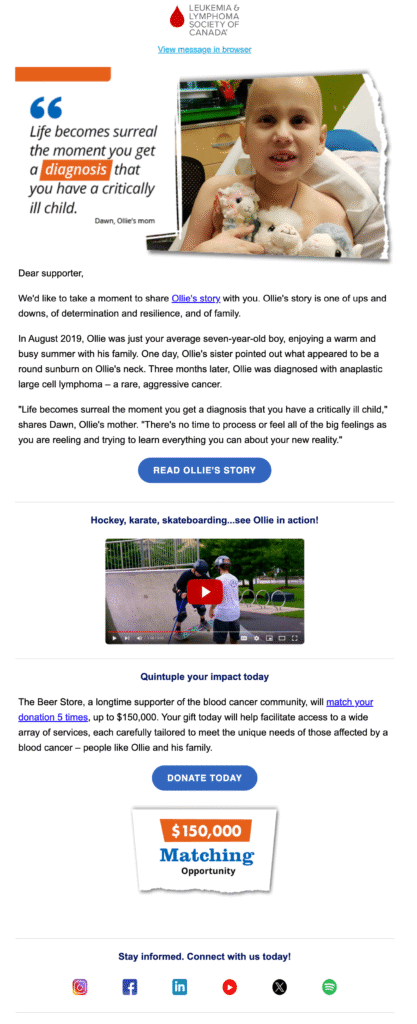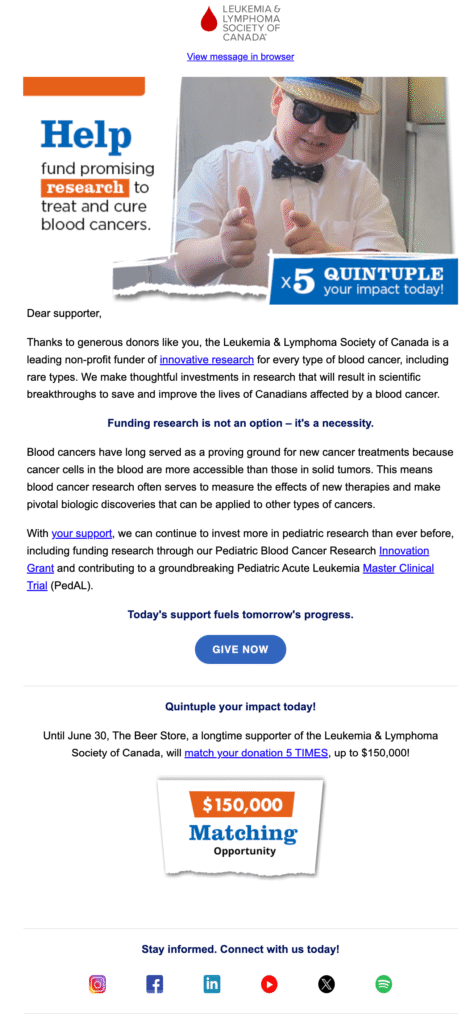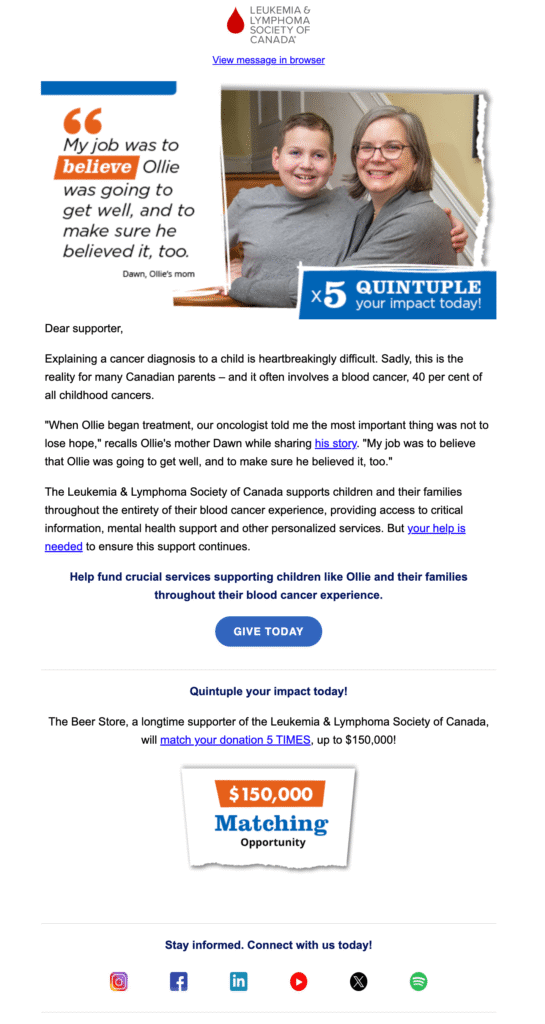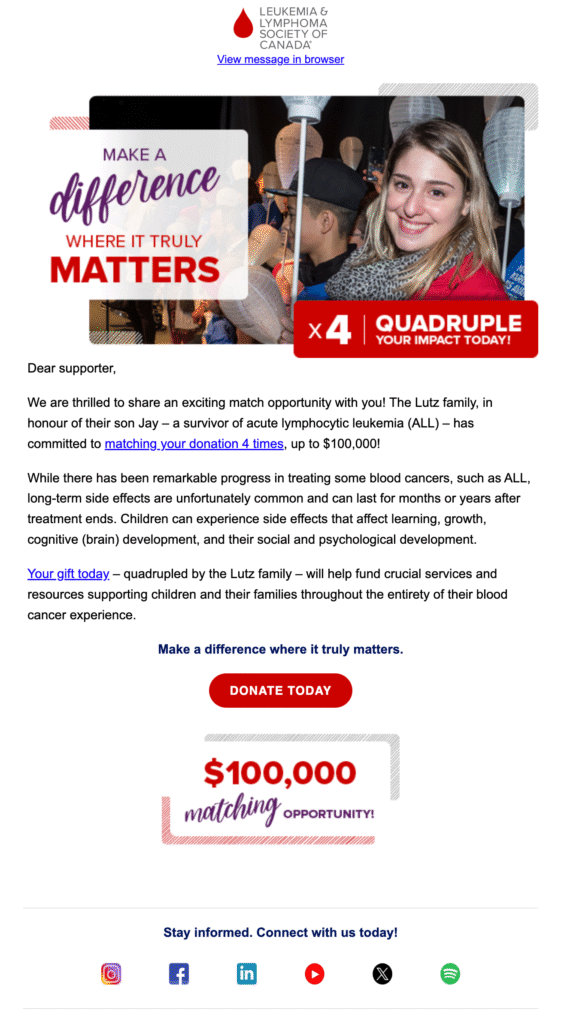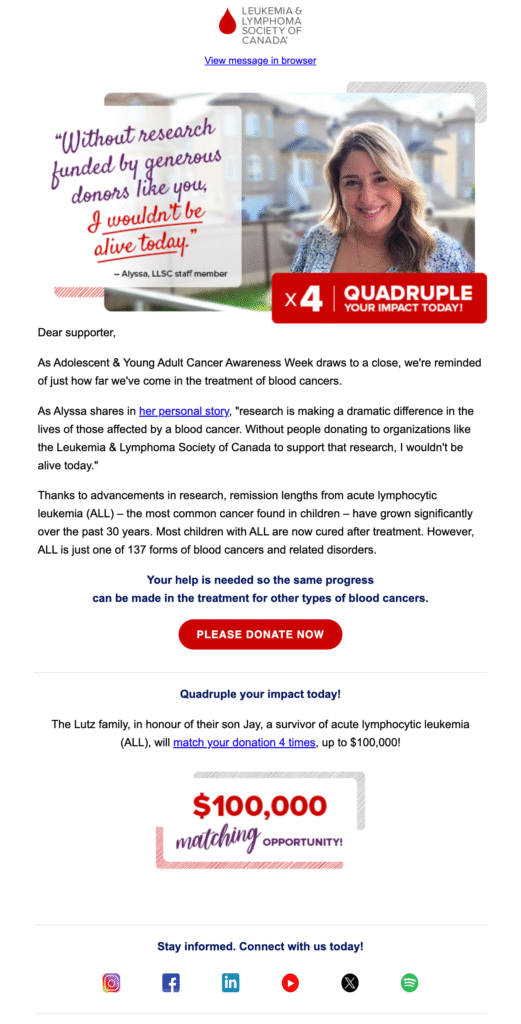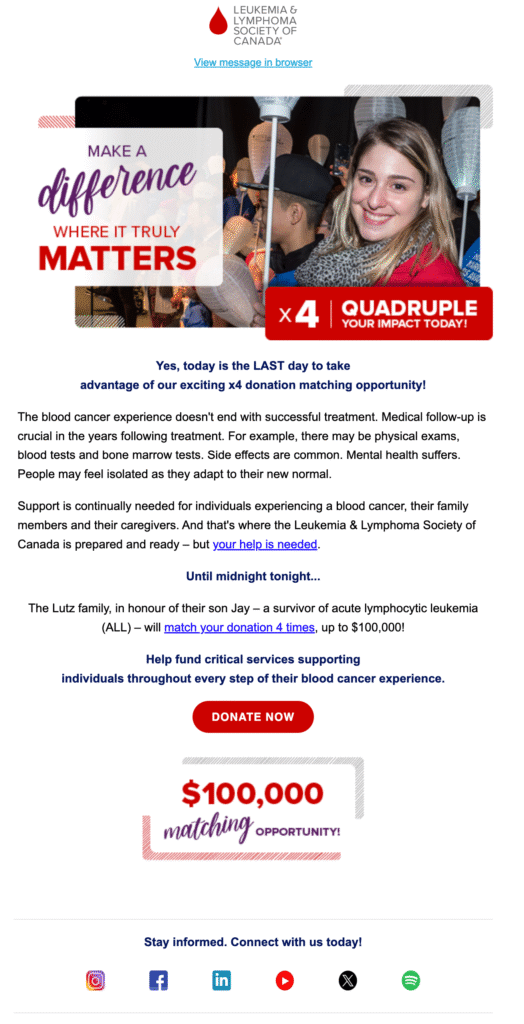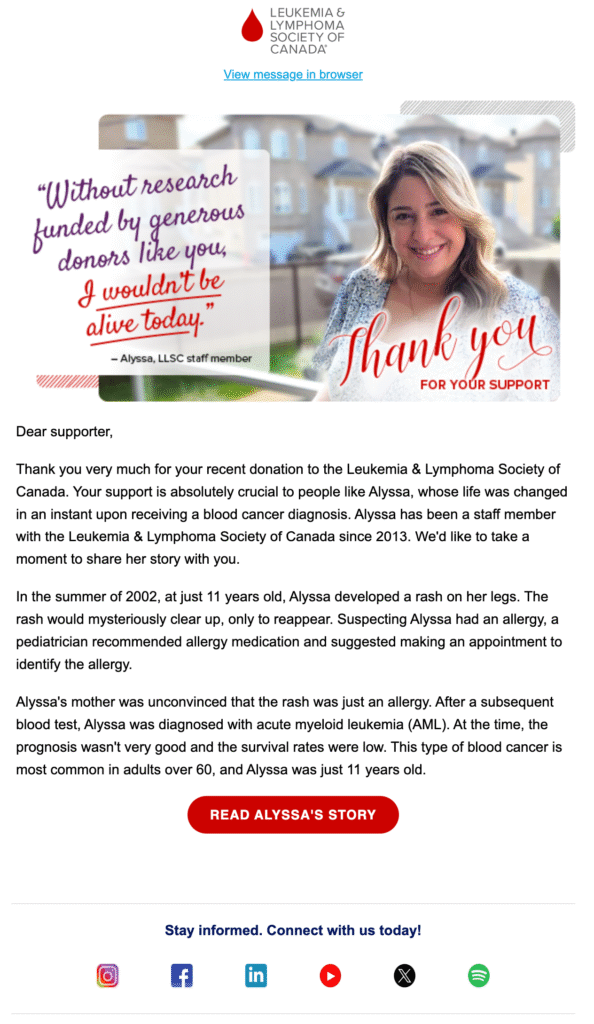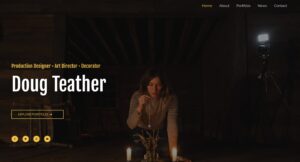In my various roles, I have been responsible for the development and distribution of content to hundreds of thousands of people via direct email campaigns, enewsletters, websites and strategic social media activity. Specifically, I have developed multi-layered national campaigns with a focus on storytelling to engage audiences to action. I take great pride in my work and always strive to create consistent, high-quality deliverables. Below are a variety of work samples. If there’s something else you’d like to see, please let me know as I may have something relevant but not included below.
Storytelling writing samples
Ollie's story
In August 2019, Ollie was just your average seven-year-old boy, enjoying a warm and busy summer with his family. One day, Ollie’s sister Abby pointed out what appeared to be a round sunburn on Ollie’s neck.
A grueling three months later—after an ultrasound, X-rays, an MRI and a variety of blood tests—Ollie was diagnosed with anaplastic large cell lymphoma, a rare, aggressive cancer.
A day that won’t be forgotten
Explaining a cancer diagnosis to a child is heartbreakingly difficult. For Ollie, it became too much; he began to plug his ears and talk loudly, normal escapism. The oncology team spent hours with Ollie and his family, answering every question they could think of.
“Life becomes surreal the moment you get a diagnosis that you have a critically ill child,” shares Dawn, Ollie’s mother. “There’s no time to process or feel all of the big feelings as you are reeling and trying to learn everything you can about your new reality.”
The family learned Ollie would have an intensive treatment period of at least six months, starting with chemotherapy.
The doctors were very positive and assured Ollie they were going to cure him. They explained that Ollie’s first 12 days of treatment would involve shocking his system to kick start the chemo and attack it. These were incredibly difficult things for a mother to hear, but Dawn remained strong and focused on the task at hand: supporting her son. “Ollie and I giggled over the image of his lymphoma cells being attacked with laser guns and disintegrating, leaving those dead cells as powder,” she shares.
The strength of family in the face of adversity
“When Ollie began treatment, our oncologist told me the most important thing was not to lose hope,” recalls Dawn. “My job was to believe that Ollie was going to get well, and to make sure he believed it, too.”
That wasn’t always easy. Ollie experienced two relapses. During the first, the cancer spread to his spine and brain. It had devastating results: Ollie was in extreme pain daily and had dangerously low sodium, causing seizures.
And then, the unthinkable: Ollie lost his eyesight, permanently.
Understandably, Ollie was exhausted, frustrated and depressed. There were only a few treatment options available to him and already several had been tried, unsuccessfully.
“As a parent of a sick kid, you are the parent, nurse, advocate, psychologist, coach, physiotherapist, miracle worker and enemy of fun,” remarks Dawn.
“You have to do so many unimaginable things to get your child to take the medicine, get the pokes, do the exercises and keep going no matter what.”
~ Dawn, Ollie’s mother
Throughout these challenging times, the family shared daily talks with Ollie about determination, resilience and survival, reminding him of how much he had already overcome.
“Navigating the world of cancer while parenting together must be one of the ultimate tests of a relationship,” reflects Dawn. “For me and Mario, we fight as one, and we never wavered in our common goal of getting Ollie well and supporting our family through what will likely be our greatest challenge.”
A sister’s gift of life
After several treatment options didn’t yield results, a drug designed to treat lung cancer was finally successful in putting Ollie’s cancer in remission. Ollie was now stable enough to undergo a stem cell transplant. He received the gift of life—a half-match stem cell donation—from his sister, who was just 11 at the time.
Ollie marked the end of his four years of oncology treatments in the summer of 2023.
“We never take for granted how very lucky we are to be here today,” Dawn says. “We are so thankful for all the support we’ve received, including from organizations such as the Leukemia & Lymphoma Society of Canada.”
Soaring to new heights
Now 11, Ollie is back at school and has found a way to keep doing many of the things he loves, including hockey, karate and skateboarding, the number one thing he was looking forward to once he got better.
Showing no challenge is too tough for Ollie, he is working with an instructor to relearn how to skateboard—soaring to new heights while performing daring tricks—despite his blindness.
With Ollie now adjusting to his new normal, the family tries to focus on the positive, while being prepared for further health issues that may arise. Among many other post-cancer side effects, Ollie faces the possibility of a secondary cancer when he’s older, as a result of the treatments that saved his life.
Alyssa's story
Alyssa has been a staff member with the Leukemia & Lymphoma Society of Canada since 2013. She is currently Campaign Lead of Field Operations.
In the summer of 2002, at just 11 years old, Alyssa developed a rash on her legs. The rash would mysteriously clear up, only to reappear. Frustrated with the lack of answers from a clinic doctor, Alyssa’s mother took her to see a pediatrician. Suspecting Alyssa had an allergy, the pediatrician recommended allergy medication and suggested making an appointment to identify the allergy.
Alyssa’s mother was unconvinced, however, that the rash was just an allergy. Alyssa was very pale and had been repeatedly getting sick for several months. Finally, a blood test confirmed anemia. After a subsequent blood test, it was becoming obvious to the doctors that Alyssa could potentially have leukemia.
Alyssa was sent for a bone marrow aspiration on August 21, 2002. By the afternoon, her entire world had been turned upside down. She was diagnosed with acute myeloid leukemia (AML). At the time, the prognosis wasn’t very good and the survival rates were low. This type of blood cancer is most common in adults over 60, and Alyssa was just 11 years old. The treatment alone could result in death.
Pact made; challenge accepted
After the diagnosis, Alyssa’s older brother Joey came to sit with her in the hospital. Unbeknownst to their parents, they made a pact: Joey would join an elite hockey team and Alyssa would beat her cancer. Joey knew his sister couldn’t resist a challenge against him, and that challenge fueled Alyssa throughout her cancer experience.
Just two days after being diagnosed, Alyssa was admitted for her first round of chemotherapy treatment. “I didn’t realize just how serious and life-threatening my situation truly was, consider it the innocence of a child,” notes Alyssa, now 32. “Today, I’m quite grateful I didn’t understand the full scope of my diagnosis.”
Faced with a six-month hospital stay, Alyssa tried to make every day as positive as possible. She continued her schooling, watched countless movies and tried to interact in creative ways with other children on the floor. Her mother was her lifeline, staying with her every day and every night. Her father and brother would also come and visit almost every day, along with other family and friends.
“There were definitely some tough times where my blood counts weren’t increasing the way they should,” recalls Alyssa. “Sometimes the sickness seemed too much to bear.” Over the holiday season, Alyssa became so ill that they questioned whether she would survive. But on February 3, 2003, she was finally discharged from the hospital and resumed as normal a life as possible.
“My brother and I both won our pact.”
This year, Alyssa celebrated 21 years in remission. Throughout that time, she graduated high school and university, and got married.
When Alyssa was diagnosed, there had been a conversation around her ability to bear children in the future. With such limited knowledge on how the course of treatment would affect her body, everything was unclear. Chemotherapy treatments had already left her with damaged fascia around her heart, so it could have damaged other areas as well. Thankfully, Alyssa became pregnant in September 2022 and recently gave birth to her second child.
“Research is making a dramatic difference in the lives of those affected by a blood cancer. Without people donating to organizations like the Leukemia & Lymphoma Society of Canada to support that research, I wouldn’t be alive today,” reflects Alyssa.
“This is why I choose to work for this organization—because they are committed to blood cancer cures and to helping people like me. In the decade I have worked for the Leukemia & Lymphoma Society of Canada, countless lives like mine have been saved. But there is still more to do.”
Ashley's story
Ashley was the British Columbia winner of the Leukemia & Lymphoma Society of Canada’s 2024 Visionaries of the Year challenge, raising more than $55,000.
Ashley’s experience with acute myeloid leukemia (AML) began in January 2021, amidst the challenges of the COVID pandemic, when she was 28 years old.
Before her diagnosis, Ashley hadn’t been feeling well for a while. In December 2020, she had left Canada to see family in Alaska for Christmas. “Due to COVID, when you returned from leaving the country you had to self-isolate for two weeks,” she recalls. “I was coughing, and would walk across a parking lot and almost pass out.” She and her family thought she had pneumonia, or maybe exhaustion as a result of a new, challenging job.
After the two-week COVID isolation period, Ashley went for a walk and found she was still getting out of breath. She promptly called a doctor who advised her to get blood work done.
A call no one wants to receive
After the blood work, Ashley received a call to go to the hospital—immediately. No further information or context was provided. Once there, a health care professional came in to talk to her. “Have you heard the word leukemia before?” they asked. They confirmed that Ashley definitely had leukemia.
It was the middle of COVID and everything was on lockdown, both inside and outside the hospital. Ashley wasn’t allowed to go home, not even to drop off her car or get her phone charger—she had to call a friend for help. For the next four weeks, she had to stay isolated in a hospital room; no visitors were allowed, not even for food delivery. She had no choice but to just accept the situation as it was; her hospital room became a safe zone, in a way.
“The whole experience was very difficult, but the people caring for me became an incredible support system, like a loving family,” she shares. “The teams at VGH (Vancouver General Hospital) and BMT (Bone Marrow Transplant) are amazing and this was really showcased during COVID.”
A challenging resurgence
Ashley endured six months of rigorous chemotherapy treatments, leading to nearly two years of remission. But in December 2022, she had a feeling something was “off”. The doctors soon confirmed that the cancer had come back, but they had caught it early through regular blood work.
“Cancer treatment may seem straightforward, but as a patient you have no idea what’s going on,” shares Ashley. “Things change every day, sometimes every hour, depending on complications and how your body is responding.”
The resurgence of Ashley’s cancer was more formidable than anticipated. She required three additional rounds of intense chemotherapy before she could undergo a stem cell transplant.
“As difficult as it was going through chemotherapy the first time, I couldn’t have imagined how challenging the stem cell transplant would be,” reflects Ashley. “You try to mentally prepare yourself for it, but nothing I could have done would have prepared me for the transplant process.”
Cancer, a life teacher like no other
All things considered, Ashley had a very good transplant experience, relatively speaking. But it was completely different than her other treatments, with many very challenging aspects. “People think you get cancer, get treatment, and then you’re done and you move past it,” she notes. “But there are so many layers that someone who hasn’t gone through would have no idea about. One of the things is that you’re forced to slow down, even if you don’t want to. You don’t have a choice.”
Today, Ashley’s blood cancer experience is still evolving – and she’s taking it one step at a time. “Cancer gives you an interesting perspective on life,” she adds. “I’ve learned that, ultimately, the only thing we can control is how we deal with and navigate whatever situation we’re in.”
“I’ve experienced first-hand the difference that donations have made.”
“Donor-funded research is truly making a difference and I really believe we’re on the right track to a better understanding of blood cancers,” says Ashley. “In just the three years since I was first diagnosed, testing and treatment has evolved and improved – that means catching problems earlier and saving more lives.”
More items available on request
I am happy to provide additional work samples including:
- External mass emails
- Internal mass emails
- Marketing plans
- Creative briefs
- Campaign reporting
